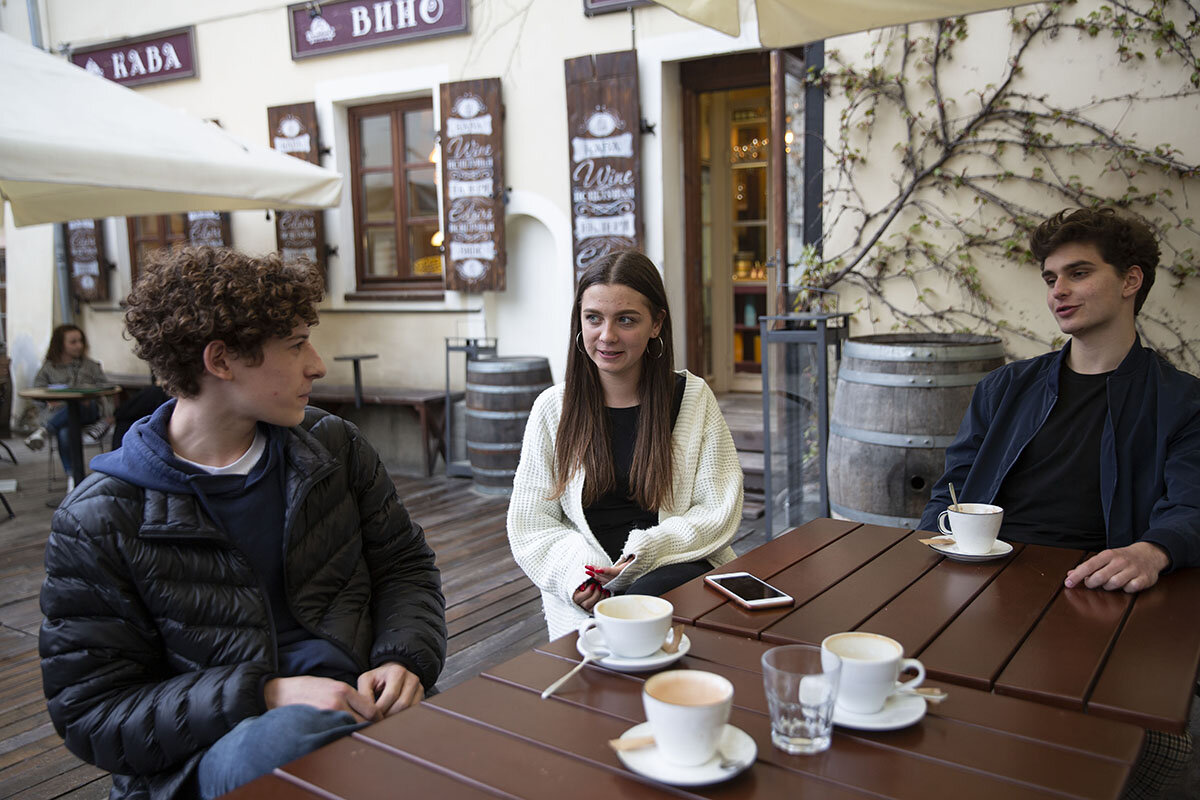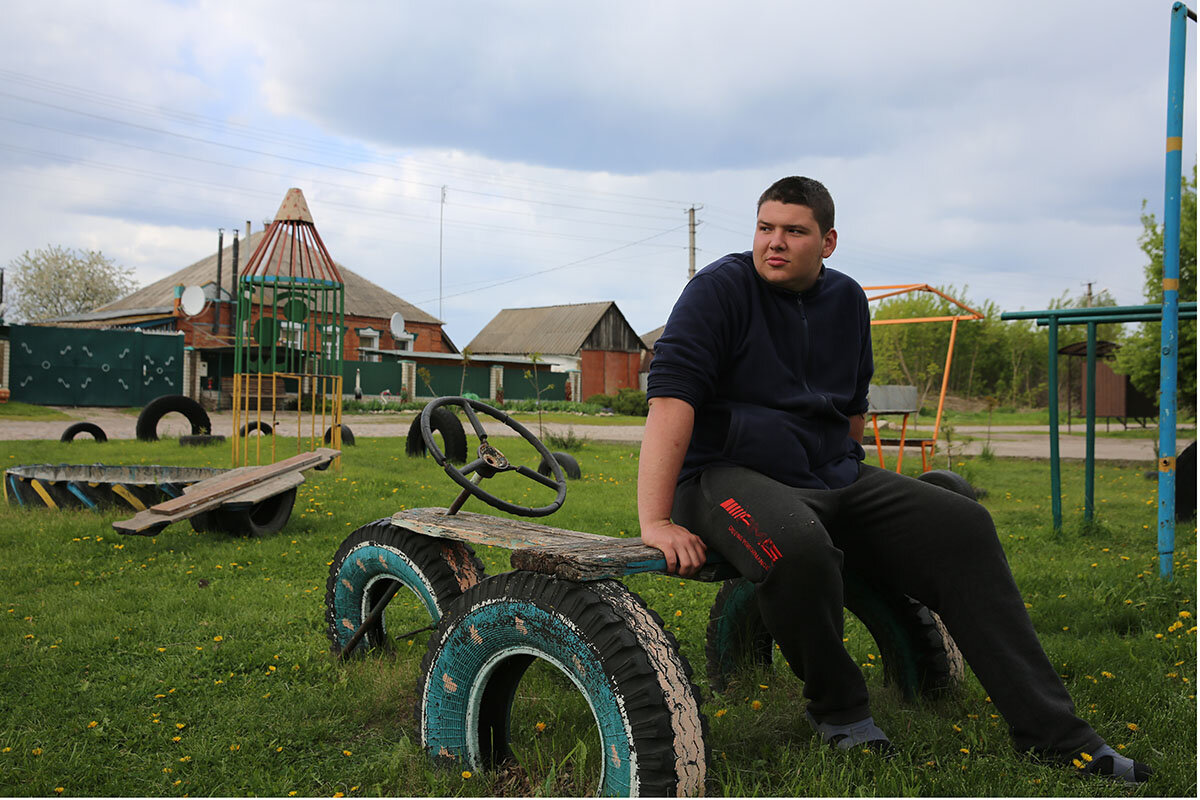Not the usual teenage dreams: Ukraine students seek future amid war
Loading...
| Bucha, Ukraine
Alisa Skoropadyk was doing the dishes when the Russian soldiers killed the man driving his car outside her home. She could see from the kitchen window where she was cleaning with her mother. The man was driving up to the Russian checkpoint, and they shot him, dragged his body out of the vehicle, and dumped it on the street of her once idyllic suburb on the outskirts of Kyiv, Ukraine.
That is just one moment the teenager cites when explaining why she scrapped plans to become a pastry chef and decided to join the police academy.
“After what I saw in Bucha, I just want to fight these orcs and liberate Ukraine,” says Alisa, using the evil, subhuman creatures of the “Lord of the Rings” trilogy to describe Russian soldiers.
Why We Wrote This
For many students, high school is about planning for the future. But amid the war, Ukrainian high schoolers are facing new existential questions about what to do with their lives.
“My dad understands it; Mom is against,” she explains while lingering with her friends outside a newly reopened supermarket in Bucha where they stocked up on chips. Her revised career choice is modeled on the path of her father, a police officer who is now serving in the army. “When I said I planned to enlist, they wanted to keep me home in handcuffs.”
Direct and indirect exposure to the horrors of war has reshaped the choices of Ukrainian students across the country. Standing at the crossroads of childhood and adulthood are about 230,000 teens who were due to finish school this year. Those still in Ukraine saw their daily routines upended and responsibilities mushroom.
Some dove deeper into their studies to cope. Others struggle to concentrate. At a time when in normal circumstances, they would be faced with decisions about what to do with their lives, now those questions are overshadowed by a more existential one: Will we survive?
“The last opportunity to be in school”
Wedged in the west of Ukraine and once part of Poland, Lviv has been a relative safe haven, a steppingstone for those on their way to Europe and a shelter for the shellshocked residents of front-line areas.
Still, war dominates daily life even as cafes burst with chatter and cherry trees blossom. Missiles rain in daily across the country, triggering an alarm system reinforced by phone apps that pushes people to shelter in bathtubs and basements. At School 8, which Russian troops used as barracks between 1915 and 1918, teachers today give classes online and spend their breaks making camouflage nets to conceal Ukrainian army tanks.
“We won’t be able to hold an official graduation this year, but we hope that there will be a victory celebration on the last day of school,” says Sofia Yasinka, the arts and crafts teacher.
Irina Hudyma was considering studying in Germany even before Russia invaded her country. She would like to specialize in biomedicine, but that program is not available in Ukraine; the closest she could achieve is a degree in biology. The invasion increased her inclination to leave the country, even though as an only child, she has greater anxiety about the prospect of leaving her parents alone in a war zone.
“I am not 100% sure I am going to apply to Ukrainian universities,” says Irina, who writes scholarly papers for fun and reads fiction to relax. But “the situation in our country is not stable. I do not know what will happen tomorrow. If I start learning at a Ukrainian university, I am not sure I will be able to finish my education here.”
This was not the end of year she and her classmates had envisioned. The pandemic already forced them to moderate their expectations. But still, they had hoped it would be a time of freedom, full of laughter together before life took them separate ways. Instead, social interactions have been limited to rare walks in the city center, kept short by air sirens, a national curfew, and parental concern.
“We were planning to eat out in restaurants, celebrate,” she says. “Not anymore. War changed everything. I am sad and upset just like my classmates are. This was the last opportunity to be in school, to enjoy childhood, to not have adult responsibilities.”
In a normal year, graduating students at School 8 would take a class trip abroad. Now they study online, something teachers say is challenging for students who have ended up in different countries. Not everybody shows up in the virtual world. Those who stayed in Lviv split their time between volunteer activities and family duties.
“I was really scared in the beginning,” says Sviatoslav Stehnii, another student in the final year. “The most difficult thing is to understand that our citizens are dying just because a guy in the Kremlin wants this.”
School 8 is known as the “German school” because fluency in German is a condition of graduation. That means students have a realistic pathway to German universities, provided their parents can afford it or they can secure scholarships. “Many of my classmates want to go study in Germany, Austria, and Poland,” says Sviatoslav. “I just want to stay here and help develop my country.”
Others are hedging their bets. “You don’t know what tomorrow will bring,” says Severyn Titko, who volunteers at a charity near the train station. He worries that Ukrainian universities in Lviv will be overwhelmed by applications from displaced students. But he is committed to carrying on with his education wherever that is.
“Learning will help me build a better future,” Severyn says. “I understand that we will win this war. We now say not ‘after the end of the war’ but ‘after winning the war,’ we will study, we will travel, and our mood will be much better.”
Solomiya Lutsiv, who plans to study psychology in Ukraine or Canada, longs for a normal graduation. “I imagined a big party and beautiful outfits,” she says, sparking laughter from the boys. “I wanted to dance to Ukrainian music until the morning with my friends, go see the sun rise together.”
“When there are bombs, I cannot sleep”
The future of the class of 2022 has been a major concern for the Ukrainian Ministry of Education. Oleh Sharov, general director of the directorate of higher education, outlines three key hurdles in this year’s university enrollment effort: the risk of military strikes across the country, the massive displacement of the population within and beyond Ukraine, and the widespread destruction of educational property.
“We get daily reports of new kindergartens, schools, and universities being damaged,” he says. “From 250 universities in Ukraine, four of them are completely destroyed and 36 are damaged.”
Those figures reflect the barrage that hit cities like Kharkiv. Ukraine’s second-largest city, near the border with Belarus and Russia, is an important hub for university studies.
Among the roughly 200 people living and sheltering in its Heroes of Labor metro station is student Evgeny Schevchenko. “This war has taken a toll on children and the mental health of youth,” he says. “When there are bombs, I cannot sleep. I start hallucinating and talking to myself.”
He has been at the station since the early days of the war because his home was hit by Russian shelling. The memory of a Russian tank rolling down his street and taking aim toward the basement door where he stood haunts him. Nights at the metro station have been difficult, with bombings jolting people awake and triggering downward stampedes in the pursuit of greater structural safety.
Access to an electric kettle allows him to boil water and wash once a week. He helps his mother care for his grandparents, whose highest comfort are two floor mattresses. The family frets over an older brother now fighting and unreachable. Despite these misfortunes, Evgeny has high hopes for his future.
“I’d like to open a restaurant,” he says, lining up for soup doled out by volunteers. “I want to become a chef and feed people. Sometimes there was not enough food for everyone here. I am not complaining, but I can always tell when food is overcooked or undercooked.”
“Our parents don’t let us wander far”
The boom of outgoing artillery and the hiss of incoming missiles also punctuate the days of Igor Klymenko, a 16-year-old living in Merlo, a village of about 500 people northwest of Kharkiv.
“Our bags are packed in case of a Russian advance here, but that never happened,” he says, sitting on an empty playground as a horse eats grass nearby. Igor is a bit less anxious now because the Ukrainian army has beefed up its air defense system.
But that, too, carries risks. Four people in a nearby village were wounded by the shrapnel of an intercepted incoming rocket. Igor fears his family could suffer a similar fate.
“The explosions have become louder lately, so our parents don’t let us wander far,” he says. “Before the war we would go to the forest, do picnics, or fish by the pond.”
Lately, he has been using the family computer to prepare for the simplified multisubject national test. Usually, Ukrainian students sit three or four exams in their best subjects. But due to the risks associated with carrying out multiple exams at multiple locations, students will take a single, simplified test covering math along with Ukrainian language and history.
Everyone can prepare for these topics online. But the lessons most present on Igor’s mind, however, are how to react to a chemical attack or avoid stepping on a mine.
“If it was up to me,” he says, “I would be in school even now.”









